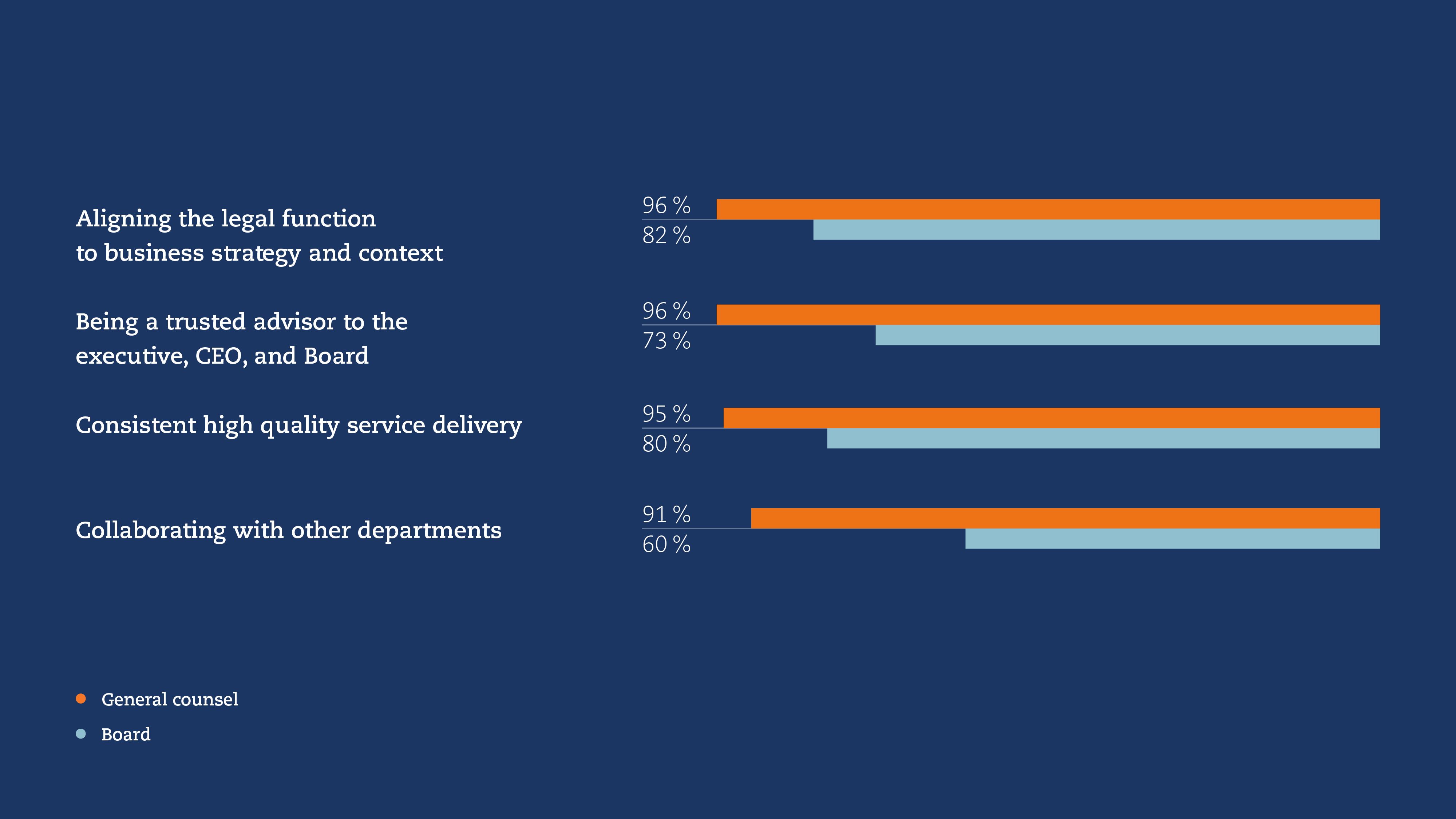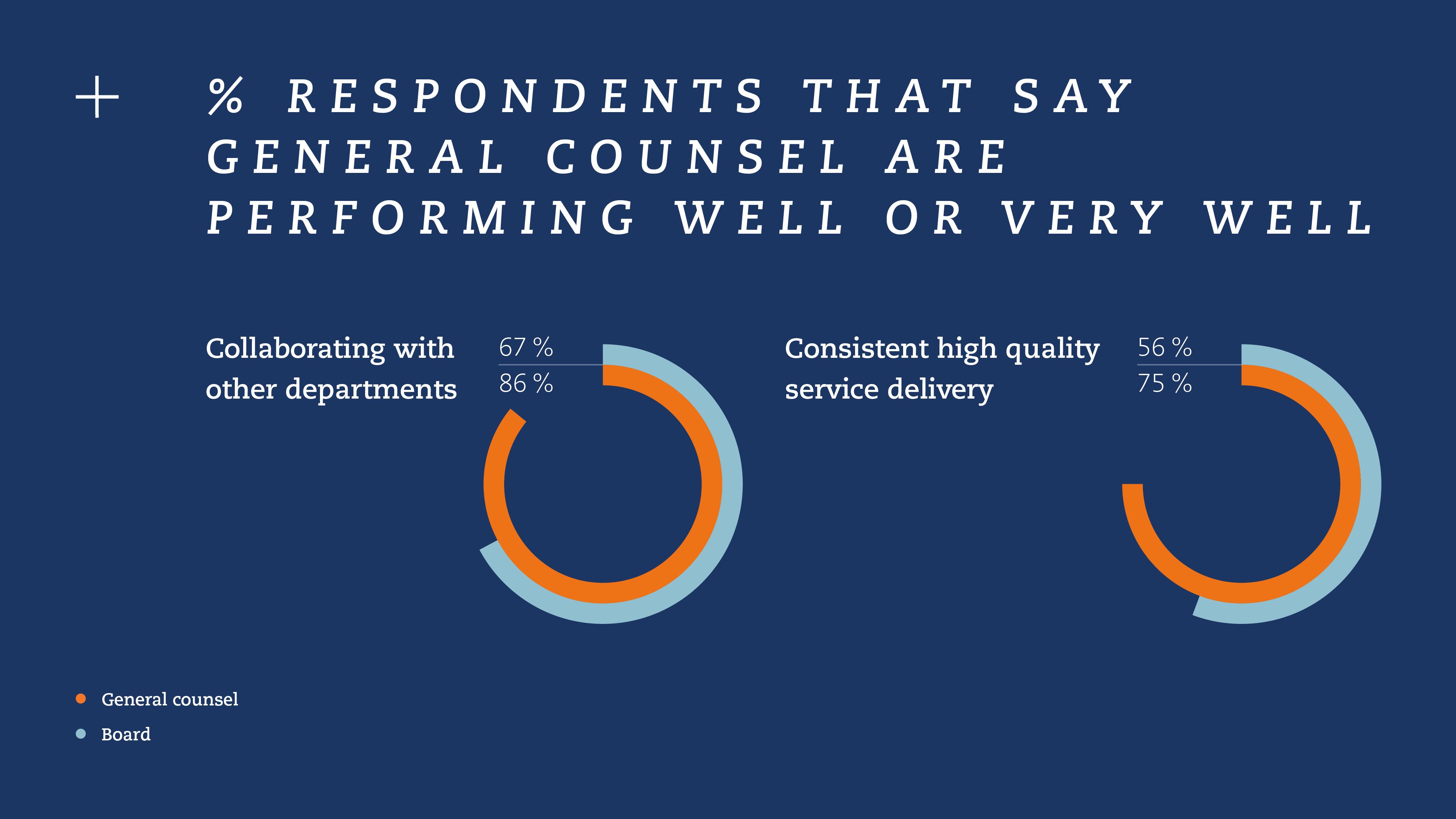Clyde & Co is pleased to present Section 4 of the Looking Glass Report 2020, in collaboration with professional member network Winmark. The annual Looking Glass Report investigates trends and developments that impact senior legal leaders, both in-house and in private practice. Section 4 considers the Role of the General Counsel and the Board, following Section 1 on the Risk Landscape, Section 2 on Growth, and Section 3 looking at Technology and Innovation.
Our research has traced how GCs and Boards have adapted as they have responded to the COVID-19 pandemic and addresses how their roles and relationship have evolved during the crisis.
COVID-19 highlights need to have correct skills balance on board and legal teams
It is essential to have the necessary strength in depth to withstand a crisis. Most General Counsel and Board Directors are positive about the agility and speed with which they have made and implemented decisions during the pandemic.
A common theme is the benefit that having a shared purpose has given to relationships between General Counsel and the Board. Having a team that has a common understanding of what's at stake and the ability to demonstrate empathy has been a positive experience for many management teams.
Many feel that the stress-test provided by the pandemic has resulted in learnings about culture and purpose that can be extended beyond the timescale of the crisis and extended outward to all stakeholders.
I think the circumstances will raise a whole set of very interesting questions about the way the Boards and Management teams need to operate to be most effective.Culture is going to be a key differentiator as to how businesses emerge from COVID-19 - cultures which are characterised by openness, collaboration and trust with all their stakeholders are the ones who are going to win.
Paul Donovan, NED, Thames Water
Increasing alignment on perceptions and factors driving change in GC role
One of the most striking developments the Looking Glass has tracked over the years is the changing character of the General Counsel role and its relationship to the Board. What was once characterised as a purely legal function dealing with the execution of intellectual property, litigation and regulations has (through having to address the challenges of globalisation, regulation and compliance requirements, data risks and constant technology change) increasingly taken on communications, reputation, ethics, projects procurement and crisis management tasks.
Driving change in GC role
As a result General Counsel play a more central role in the governance of organisations and the required skillset has expanded to encompass leadership, strategic vision and change management. The trend for in-house legal teams to become more a part of the organisation's leadership structure has necessitated them having to develop a deeper and more integrated understanding of organisational objectives and operations.
Both Boards and General Counsel agree that a major factor driving change in the role is dealing with specific legal and regulatory developments. Interestingly, this year General Counsel have identified factors impacting their role that aren't as strongly recognised by the Board, particularly the need to deal with specific commercial risks that need to be managed. General Counsel identify stronger drivers for change, possibly because they experience these drivers on a day-to-day basis.
Given the increasingly central role General Counsel are playing in organisations it is incumbent upon Boards to ensure they recognise and understand the pressures impacting their legal teams; and to give them the time, trust, authority and budget (for investment in training and technology) required to support secure and integrated growth. They need to provide adequate operational tools for General Counsel to make the strategic contribution that Board Directors and General Counsel are agreed is an important and growing part of the role.
For the past two years perceptions of the General Counsel role among Board Directors has become more closely aligned with General Counsel's own perceptions of what they do. This trend has continued, and the Board's recognition of the strategic contribution of General Counsel is increasing, to the extent that the Board perceive they spend 27% of their time working on strategic legal projects and 19% of their time working on strategic projects for the wider business. General Counsel are clearly further establishing their place at the leadership table.
There is general agreement between Board and General Counsel about the most important parts of the General Counsel role, and the hierarchy of importance has been generally consistent over time. Both perceive 'aligning the legal function to business strategy and context' to be a key function of the role, and there is strong agreement that 'being a trusted advisor to the executive, CEO and the Board' is important.
Board Directors agree that the General Counsel role has an important strategic focus but there remains a difference in perception about how important the General Counsel role is in having an operational impact on the wider business. 'Collaboration with other departments' is considered an important part of the role by 91% of General Counsel and only 60% of Board Directors. Similarly 'empowering the business through training and self-service tools' is considered key by 77% of General Counsel and just 33% of Board Directors.
General Counsel perceive pro-activity as a more important aspect of their function than is currently recognised by Boards. 'Horizon scanning to pre-empt issues' is considered an important part of the role by 91% of General Counsel and only 50% of Board Directors. 'Proactively assessing the risk landscape is considered key by 77% of General Counsel and just 33% of Board Directors and 'advising the business on ethical and moral risks' is considered important by 72% of General Counsel and only 33% of Board Directors.
In the wake of COVID-19 the importance of proactively assessing the risk landscape is likely to be top of mind for business leaders. Should the potential of a pandemic have been a bigger part of risk planning and could a more proactive approach have picked up the potential risks and have mitigated their impact? A re-evaluation of the strategic importance of the General Counsel role is likely, with a greater emphasis on both identifying risk and navigating the changes to the risk landscape that the pandemic has brought about.
GC role, responsibilities and performance
Board and General Counsel views on the main elements of the Board's role are also reasonably well aligned, and the hierarchy of importance has remained generally consistent over time. Board Directors, however, perceive 'staying up to date with the latest thinking, technology and best practice', along with 'reviewing talent and succession planning' and 'engaging with internal stakeholders' as a more crucial part of their remit than is recognised by General Counsel.
Responsibilities and performance
It is interesting that General Counsel and Boards tend to emphasise the importance of the strategic and 'vision' aspects of each other's role (rather than operations and communications aspects) whilst placing greater importance in the operations and communications focus of their own role. This could point to a wider trend for organisations to undervalue the increasingly complex operational challenges that all senior leaders are facing. It is likely that the COVID-19 crisis will increase recognition by the Board and across all functions that delivery of strategy is dependent on establishing an integrated and multifaceted operational structure.

The perception of General Counsel performance between the two groups is largely unchanged since the previous Looking Glass report, and is well aligned.
50% of Board Directors say General Counsel are performing well compared to 53% of General Counsel, and over the years there has been an increasing recognition by the Board of the contribution of General Counsel.
Both General and Board Directors perceive improved performance at 'collaborating with other departments'. 86% of General Counsel and 67% of Board Directors say the role is performing well compared to 64% and 33% respectively last year.
The board agrees that General Counsel perform well in 'being a trusted advisor' and 'aligning the legal function to business strategy and context'.
The Board does not perceive General Counsel as performing well at 'advising the business on ethical and moral risks', but this is a less important aspect of the General Counsel role from the Board's perspective.
General Counsel see the legal department as taking primary responsibility for both identifying and managing risk within the organisation, whilst recognising that risk, compliance and the Board also having a crucial role. Board Directors perceive a more prominent role for themselves and for the risk function.
These gaps in perception between the Board and General Counsel are not large and their views have become more aligned over the history of the study. Nevertheless, in a global business environment where alignment and integration between business functions is an increasingly important component of delivering all business objectives, a discussion to ensure departmental clarity of responsibilities in relation to risk management is essential.

The majority of General Counsel and Board Directors agree that legal, risk, compliance and audit teams co-operate effectively to manage risk, but a quarter of them feel that roles and responsibilities could be more clearly defined.
There is agreement that General Counsel and Board Director roles are increasingly involved with managing rather than preventing risk. This, along with many other findings in this year's report, suggests that Boards and General Counsel have strong alignment around purpose and priorities. The required improvements are more focused on achieving clarity of communication and operational efficiencies than achieving a shared vision.
The legal team is responsible for horizon scanning and raising thought leadership issues if they are not on the agenda.Our role is to listen to what the business is saying, analysing that and providing them with the information they need.
General Counsel, Financial Services
One aspect of communication that is identified as an area for attention is formal reporting on legal risks to the board. Around half of all respondents feel this needs to be improved. Boards are under increasing pressure to show flexibility and innovation in how they manage reporting and other information flows within the business and are increasingly trialling new methods of executive reporting as well as implementing initiatives such as the use of advisory panels and Board portals. Harnessing technology and creative management techniques will be an important driver of improved reporting, cross-function communication and departmental integration.
The content of this article is intended to provide a general guide to the subject matter. Specialist advice should be sought about your specific circumstances.
